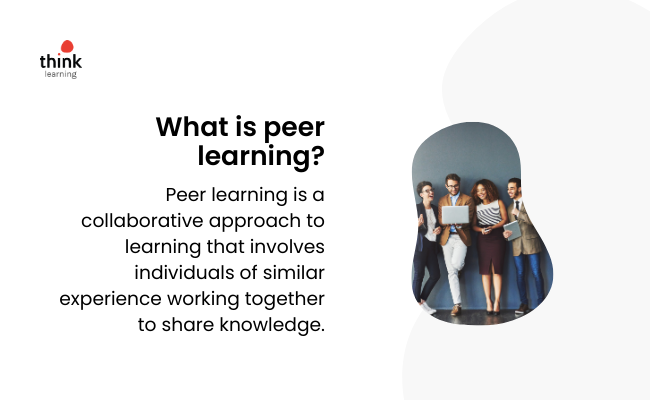
Peer learning is a proven method using the knowledge of your current staff to accelerate team development.
In today’s fast-paced and ever-changing work environment, learning and development has become essential for individuals and organisations alike.
One approach that has gained popularity in recent years is peer learning, where individuals of similar skill levels or experience work together to share knowledge, skills, and experience.
Peer learning can take many forms, such as group discussions, problem-solving exercises, role-playing, and feedback sessions.
According to research, it can be a highly effective way to learn, with 55% of employees saying they turn to their peers before their manager.
In this blog, we will explore the benefits of peer learning, how it can be incorporated into a learning and development strategy and provide tips for creating a successful programme.
Keep reading to learn:
- What is peer learning?
- Why is peer learning important in the workplace?
- What are the benefits of peer learning?
- How to integrate peer learning into your L&D strategy
Let’s get started.
What is peer learning?
Peer learning is a collaborative approach to learning that involves individuals of similar skill levels or experience working together to share knowledge, skills, and experience.
It is a process of learning from and with one another, rather than relying solely on a teacher or instructor.
Peer learning can take many forms, such as:
- Group discussions
- Problem-solving exercises
- Role-playing
- Feedback sessions
It provides a supportive and interactive learning environment that encourages active participation and engagement.
Peer learning can benefit individuals by helping them to develop critical thinking skills, gain new perspectives, and build relationships with their peers.

It can also benefit organizations by promoting a culture of continuous learning, improving employee performance and productivity, and fostering innovation and creativity.
Overall, peer learning is a valuable approach to learning that can benefit individuals, teams, and organisations alike.
💡 Pro Tip
One easy way to establish peer learning is by implementing a mentoring program. See how you can use our mentor matching tool to create long-lasting relationships.
Learn more about mentor matching
Why is peer learning important in the workplace?
Peer learning is an important aspect of any workplace.
It provides employees with the opportunity to learn from their colleagues, share knowledge and experience, and develop new skills.
Peer learning can help to foster a culture of continuous learning and improvement, where employees are encouraged to learn from one another and to collaborate on projects and tasks.
This can lead to increased productivity, as employees are better equipped to solve problems and work more efficiently.
Peer learning can also help to improve employee engagement and job satisfaction, as employees feel valued and supported by their colleagues.
Additionally, peer learning can help to build stronger relationships among team members, promoting better communication and cooperation.
Overall, peer learning is an important component of a successful workplace, as it can contribute to the growth and development of employees, teams, and the organisation as a whole.
What are the benefits of peer learning?
Peer learning is a powerful tool that can benefit individuals, teams, and organisations in numerous ways.
They can generally be summed up as:
- Sharing knowledge
- Create a learning culture
- Improve employee engagement
Sharing knowledge
First and foremost, peer learning allows individuals to learn from one another, sharing knowledge, skills, and experience that can help to improve job performance and productivity.
This can be particularly beneficial in the workplace, where employees often have different areas of expertise and can learn from one another’s strengths.
Related: How technology can improve learning transfer
Create a learning culture
Peer learning can help to foster a culture of continuous learning and improvement.
Related: How to improve learner’s mindset in the workplace
When employees are encouraged to learn from one another, they are more likely to seek out new knowledge and skills, and to apply what they learn to their work.
This can lead to innovation, as employees are better equipped to solve problems and develop new ideas.
And when employees are encouraged to work together and learn from one another, they are more likely to collaborate on projects and tasks, leading to better outcomes and improved performance.
Improve employee engagement
Peer learning can also help to improve employee engagement and job satisfaction.
When employees feel valued and supported by their colleagues, they are more likely to be motivated and committed to their work.
Related: How to improve learner engagement
Peer learning can also help to build stronger relationships among team members, promoting better communication and cooperation.
How to integrate peer learning into your L&D strategy
Incorporating peer learning into a learning and development strategy can be a valuable way to enhance employee skills and knowledge.
To do so, you can start by identifying areas where peer learning can be most beneficial, such as in onboarding new employees, developing specific skills, or improving team collaboration.
From there, you can create opportunities for peer learning, such as job shadowing, mentorship programs, or cross-functional team projects.
Related: How to start a mentoring programme
ThinkLink is a mentor and coach relationship management tool that integrates into your LMS.
You can easily configure and manage relationships and keep track of their impact.
By incorporating peer learning into a learning and development strategy, organizations can improve employee performance and productivity, promote collaboration and teamwork, and ultimately contribute to the success of the organisation.
Learn more about Think by booking a demo with our team. We can show you our full demo and what tools we have on offer to help you achieve better peer learning across teams.

